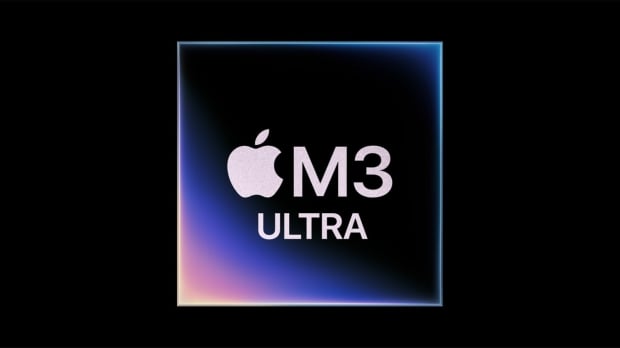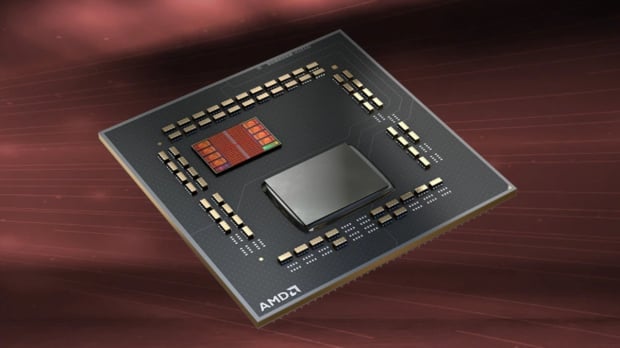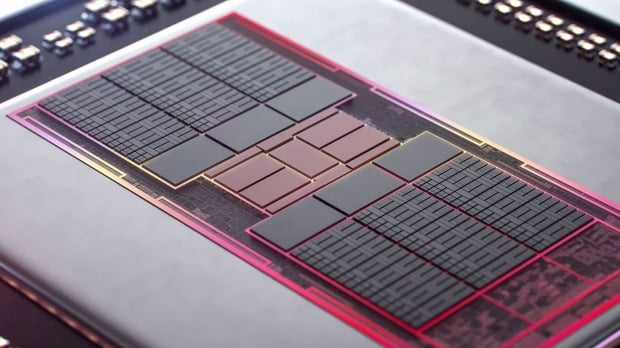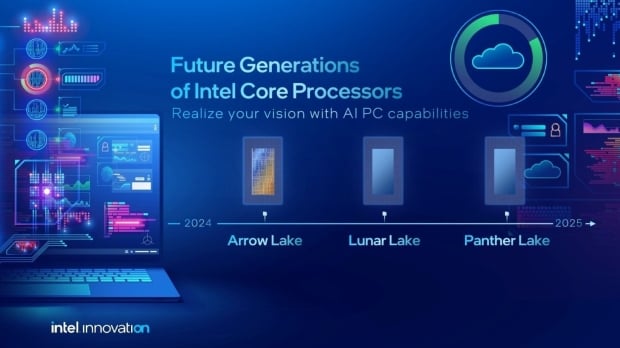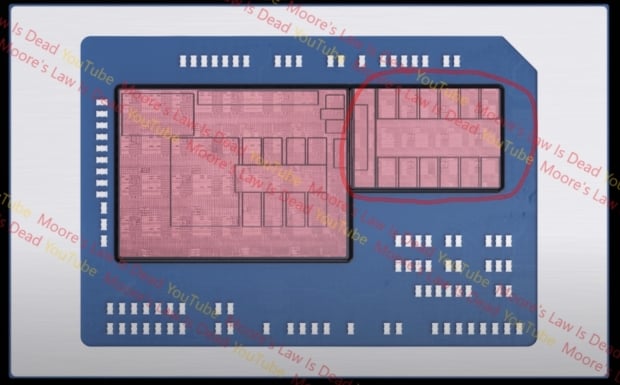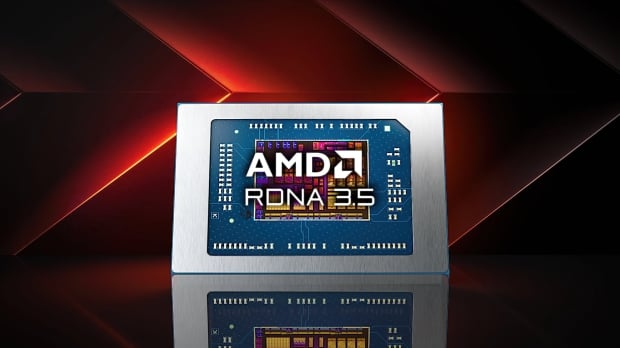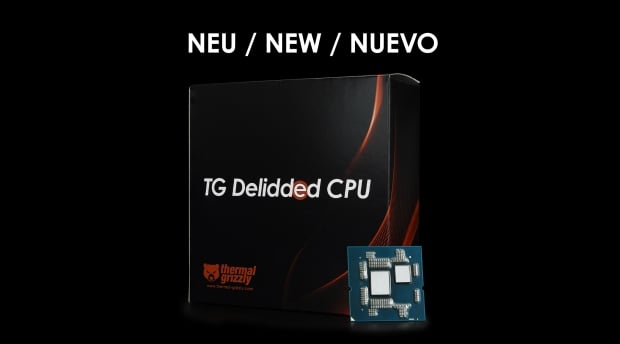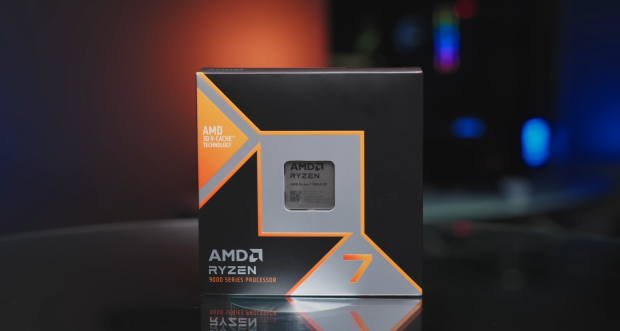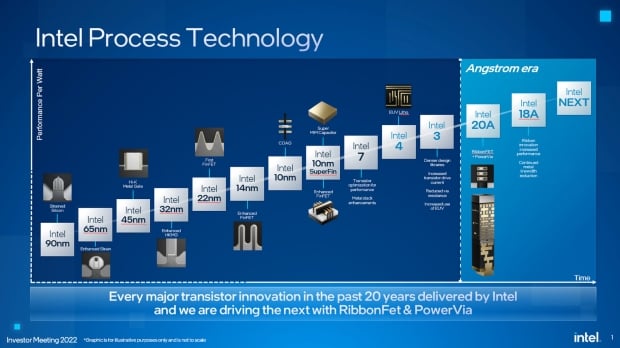CPU, APU & Chipsets
All the latest CPU and chipset news, with everything related to Intel, AMD, ARM, and Qualcomm processors & plenty more.
Apple intros M3 Ultra chip: dual M3 Max with UltraFusion tech, monster-level Apple Silicon
Apple launched a flurry of new products this week, with its new Mac Studio powered by its new M3 Ultra processor, and boy, what a chip it is.
The new Apple M3 Ultra processor combines 2 x M3 Max chips together, where they act as one: doubling the CPU core count, GPU core count, and performance through the roof, rivaling its new M4 processor. Apple's new M3 Max processor features up to 32 cores of CPU (24 performance cores and 8 efficiency cores) which is the highest number of CPU cores on a Mac to date (inside of the new Mac Studio powered by M3 Max).
Not only that, but the M3 Ultra chip has up to 80 GPU cores ensuring top-tier Mac gaming performance, and the most amount of GPU cores on Apple Silicon, ever. 96GB of unified RAM is the norm on the Apple M3 Max chip, but you can configure (for much more money) up to 512GB of unified RAM (!!!) while SSD storage can be ballooned up to 16TB inside of the new Mac Studio.
AMD's Ryzen 9 9950X3D and 9900X3D CPUs rumored to be imminent, arriving March 12
AMD's next 3D V-Cache Zen 5 processors, the Ryzen 9 9950X3D and 9900X3D, are purportedly set to arrive on March 12.
VideoCardz provided the scoop with this one, and apparently the info comes directly from AMD over in China.
The tech site has published some presentation slides for these top-end Ryzen 9 X3D models which carry the March 12 launch date, but we can't know for sure if this material is genuine (though it looks authentic enough).
AMD's next-gen APU sticking with RDNA 3.X for graphics is disappointing
According to reports and leaks, AMD's Medusa Halo is an upcoming mobile APU that will be a beast for PC gaming. Built on the forthcoming Zen 6 CPU architecture, it will deliver better CPU performance than Strix Halo and bump up the integrated Radeon graphics Compute Unit count from 40 to 48 - a 20% increase. This is unprecedented for integrated graphics, as you're looking at performance that could rival powerful discrete GPU options.
With increased memory bandwidth, the APU could rival the desktop GeForce RTX 4070 in some titles. This information arrives via leaks and insider sources, so take this with a grain or two of salt. Still, with impressive integrated Radeon graphics, the latest word on Medua Halo is that it will stick with RDNA 3.X instead of the newer RDNA 4 architecture.
Based on what we've seen first-hand with the first two RDNA 4 discrete desktop graphics cards (check out our reviews of the AORUS Radeon RX 9070 XT ELITE and GIGABYTE Radeon RX 9070 GAMING OC), AMD's latest architecture is a massive improvement over RDNA 3.
Intel's next-gen Panther Lake SoC delayed: concerns over its in-house Intel 18A process node
Intel recently said its next-gen Panther Lake CPUs made on its new in-house Intel 18A process node were releasing later this year, but according to an insider the new chips have been delayed into 2026 and the 18A process could be the issue.
In a new report from insider Ming-Chi Kuo, we're hearing that Intel's new mobile-focused Panther Lake SoCs have been delayed, citing concerns over the performance of Intel's new 18A process node. Kuo writes: "Given the typical 2-4 week gap between chip and finished product (PC/NB) shipments, PTL notebooks may not become widely available until 2026, implying that Intel will miss the crucial year-end holiday sales season in 2025 and 2H25 revenue and profit will face downside risks".
Intel has reportedly not been able to get the 18A yield rates right, with an internal survey pointing to levels in Q3 2025 that won't be an improvement over where they are now, meaning mass production in the desired timeline is virtually impossible. We recently heard that Intel Foundry Services (IFS) and its new 18A process node was only hitting 20-30% yield rates, even after the company's new co-CEO said otherwise.
AMD's next-gen Medusa Halo APU leaks: Zen 6 chip rumored with RTX 5070 Ti levels of gaming perf
AMD's next-generation Zen 6-based Medusa Halo APU will be a game-changer for the company, packing 24 cores and 48 threads of Zen 6 CPU power joined by a new SKU rumored with a monster 48 GPU cores (up from 40 GPU cores on Strix Halo APUs).
In a new video from leaker Moore's Law is Dead, one of his sources said: "I can confirm Medusa Halo has at least a variant with 48 CUs, and also that there should be a 384-bit option in addition to a 256-bit option for the bus".
AMD's new Medusa Point APU will feature a single Zen 6 CCD with 12 cores and 24 threads, with between 16 CUs and 32 CUs of RDNA 3.X integrated GPU on a 256-bit memory bus, very similar to Strix Point APUs. However, the flagship Medusa Halo APU is rumored with up to 48 CUs of RDNA 3.X GPU on a possibly far higher 384-bit memory bus, that should see 30-50% performance gains over the already very impressive Strix Halo APU.
Ex-CEO of Intel Craig Barrett fires up, says 'Fire the Intel board and rehire Pat Gelsinger'
Former Intel CEO Craig Garrett has written a new opinion piece on Fortune, where he wraps up the article by saying "fire the Intel board and rehire Pat Gelsinger".
Garrett has an informative piece on Fortunte, writing a fantastic explanation into the situation with Intel from the former CEOs perspective. Garrett says that the only solution for Intel's problems is to break the company into two pieces: a design company and a wafer fabrication (foundry) company, and he also agrees that Intel shouldn't sell its foundry division (IFS) to TSMC, but "strongly disagree with their argument that Intel should be broken up".
He whips: "The board members are well meaning but off target. They are two academics and two former government bureaucrats, just the type of folks you want dictating strategy in the ruggedly competitive semiconductor industry".
AMD's next-gen Medusa Point 'Zen 6' APU rumor: dropping RDNA 4/5 GPU for updated RDNA 3.X GPU
AMD's next-generation "Medusa Point" APUs based on the new Zen 6 architecture were rumored to feature an RDNA 4, RDNA 5, or unified UDNA GPU, but fresh rumors suggest that's not happening and that an updated RDNA 3.X GPU will be used in the new monster APU.
The next-generation Zen 6-based Medusa Point APU is reportedly not using the just-launched RDNA 4 architecture, or the upcoming RDNA 5 or UDNA chips, but rather an upgraded RDNA 3.X GPU according to leaker Golden Pig Upgrade on Weibo. There have been rumors of RDNA 5 or UDNA on Medusa Point and Zen 6, but the new APUs will continue using the proven RDNA 3.X GPU.
AMD has used its new RDNA 3.5 GPUs inside of its recent Zen 5-based Strix Point and just-launched Strix Halo APUs, with 16 GPU cores inside of Strix Point and a whopping 40 GPU cores inside of Strix Halo. AMD could beef up the GPU cores again for Medusa Point, without the advancements and features from RDNA 4/5 or UDNA, given its an APU and not meant for high-end ray-traced gaming.
Thermal Grizzly now selling delidded Ryzen 9 9800X3D CPUs, warranty covers heavy overclocking
Thermal Grizzly is now selling delidded AMD Ryzen 9 9800X3D processors, tested to hit far higher overclocked frequencies, with its heatspreader removed and ready for exotic cooling tech.
Overclocker Roman "Der8auer" Hartung is the owner of Thermal Grizzly, with the new TG Delidded CPU series starting with the AMD Ryzen 9 9800X3D, but the company will soon offer other models including the flagship Ryzen 9 9950X3D "at a later date". Each of the chips are delidded and thoroughly cleaned, with each processor undergoing a functionality test.
The results of this tested are documented by TG, with a screenshot of the test saved on a USB stick, included with each TG Delidded CPU. Not only that, but the USB stick also packs a microscope image of your delidded processor. Thermal Grizzly is also providing a 2-year warranty on its TG Delidded CPU series, starting with the new 9800X3D.
AMD Ryzen 7 9800X3D experiencing 'CPU Failure' issues, more common on ASRock motherboards
AMD's new super-popular Ryzen 7 9800X3D processor is now in the headlines for all the wrong reasons, with multiple people posting on Reddit reporting crashing and failure incidents on their new Zen 5-based X3D gaming CPU.
There is a huge megathread on the ASRock subreddit, with an "abnormal" amount of Ryzen 7 9800X3D processors failing inside of systems, and it looks like the issues are more common on ASRock motherboards. Moderators of the thread have reported that an "abnormal amount of 9800X3Ds that are dying, often (but not exclusively) on ASRock boards".
Redditor u/SoupaSoka says that the posts are "frequent enough that we'd like to consolidate discussion here as well as provide consolidated updates if any news comes from ASRock, AMD, or elsewhere". Well, here's another source for you guys.
Intel 18A process has 'disappointing' yield rates of 20-30% with mass production now impossible
Intel recently announced that its 18A process node was "finally ready" and that chips made on the new node would tape-out in 2H 2025... but fresh rumors say there are major issues and that delays are coming.
In a new post on X, industry insider Ming-Chi Kuo said that the first Panther Lake engineering samples (ES) made on Intel Foundry's new 18A process node are being tested by major PC ODM/ESM makers, and that in an early 2025 industry survey from Kuo, Intel 18A yields are below 20-30%.
Kuo noted that the Intel 18A process node yields sitting at 20-30% "doesn't bode well for Intel's goal of hitting mass production" in 2H 2025, and that on top of the technology challenges, Intel Foundry Services (IFS) faces a "big obstacle" in winning outside orders due to its organizational setup, supply chain management, and culture"and that's where TSMC"totally stands out".


